When Israel was founded as a nation in 1948, patriotic zeal created the belief that hard effort could make this new Jewish state self-sufficient, and able to grow its own food.
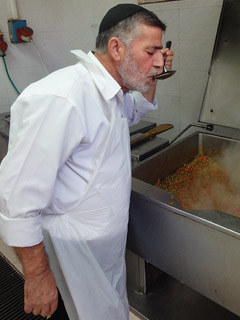 This ambitious goal would require making fertile even the Negev Desert, a scorched wasteland which comprises much of Israel’s southern half. (Negev is a Hebrew word that means “dryness.”) As David Ben-Gurion, Israel’s first prime minister, wrote in 1954, when he moved to the Negev himself, “For those who make the desert bloom there is room for hundreds, thousands, and even millions.”
This ambitious goal would require making fertile even the Negev Desert, a scorched wasteland which comprises much of Israel’s southern half. (Negev is a Hebrew word that means “dryness.”) As David Ben-Gurion, Israel’s first prime minister, wrote in 1954, when he moved to the Negev himself, “For those who make the desert bloom there is room for hundreds, thousands, and even millions.”
Such passion accomplished incredible things. In the late 1950’s and early 1960’s, Israelis pioneered the use of “drip irrigation”—which delivers water directly to a plant’s roots. Later innovations in desalination processes and water recycling drew the world’s attention. Soon enough, an arid coastal plain between the Mediterranean and Dead Seas was alive with vast fields of watermelons, tomatoes, olive trees, and date palms.
Some people succeeded wonderfully and have thrived here; others, totally failed.
Since then, however, the garden hasn’t continued to bloom equally for all Israelis. This became clear when I visited Rachel Bier, a young social worker in Dimona, a poor village set hard along the Negev’s edge. Beir is a slender and pale young woman, who always wears her hair covered by a knotted silk scarf. As she tells it, most of Dimona’s economic problems, and the domestic difficulties they cause (such as husbands beating their wives), can be traced back to decisions made a half-century ago.
“When he set about to establish the state of Israel, Ben Gurion knew everyone in this country could not live in Jerusalem and Tel Aviv. So, he decided to send various groups of people to the Negev. At that time, there was nothing here. I mean, literally, nothing. Ben Gurion hoped these new citizens would bring life to the desert and, in fact, some of them did. But many more were simple people, who’d come from simple lives, and they couldn’t cope. They came to Israel because things were not good for them at home, yet they had no education, and no money, to bring with them. Some people succeeded wonderfully and have thrived here; others, totally failed.”
Today, the area’s original settlers (who came from Russia, India, Morocco, and Roumania, among other places) are mostly old people. It is these senior citizens who are fed at the Meir Panim soup kitchen in Dimona, which is also where Beir has an office and her counseling practice. Through a few emails with a man named Nissim El-Mekayes, the restaurant’s manager, I’d arranged to assist in cooking there for a few days.
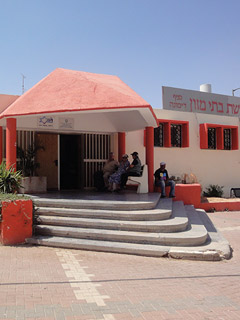 Traffic was scant on my drive down from Jerusalem. For many miles, as I drove through the desert, all I saw were ramshackle groupings of huts built of corrugated tin, and blown nearly flat by the constant wind and sandstorms. These are bedouin communities, and the Israeli government would very much like to see these sad camps eradicated, and the Bedouins relocated into better housing. Bedouins are nomads, however, and prefer freedom and dwelling close to the land, even when this also means they live in squalor.
Traffic was scant on my drive down from Jerusalem. For many miles, as I drove through the desert, all I saw were ramshackle groupings of huts built of corrugated tin, and blown nearly flat by the constant wind and sandstorms. These are bedouin communities, and the Israeli government would very much like to see these sad camps eradicated, and the Bedouins relocated into better housing. Bedouins are nomads, however, and prefer freedom and dwelling close to the land, even when this also means they live in squalor.
The terrain I was passing through used to be along what historians now call the “Spice Route.” It started in Yemen, where a particular tree produces sap which was dried and turned into incenses like Frankinscence and Myrrh. These precious substances, sweet-smelling when burned, were used in the temples of Jerusalem, and elsewhere, to mask the horrible odor created by all the animals sacrificed during holy rituals. On a journey that spanned nearly 2,000 miles, traders would traverse the Arabian Desert to the city of Petra (in what is Jordan today), then head across the Negev. Caravans of camels were required, maybe several thousand at a time, to carry food, water, and guards to protect against bandits. Finally, when the caravans arrived at Gaza, on the Mediterranean Sea, the incense, as well as spices such as pepper, cardamom, cinnamon, and saffron, was shipped to India, Africa, and around Europe.
My journey in an air-conditioned, four-wheel drive vehicle was altogether less arduous. I arrived in Dimona earlier than expected, and found the restaurant closed. It was barely eight o’clock in the morning, yet the sun was beating down mercilessly. I found a concrete bench in the shade of a covered porch, and waited for what came next.
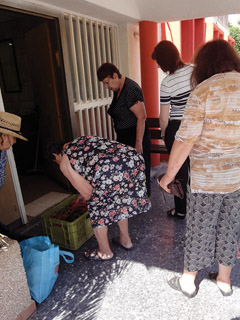 Lined up on the porch to my right are a collection of cardboard boxes. Later, I’ll learn these containers hold produce that’s been deemed too bruised, molded or mashed for Albert, the restaurant’s head chef, to cook with, and so it is left here, free for the taking. A small group of solidly-built women rummage about, speaking loudly in Russian, as they salvage what they can of peppers, tomatoes, red grapes and eggplant. Obviously, they haven’t come from too far away as they wear shapeless “house” dresses, and bedroom slippers. They ignore me, and I do my best to avoid looking at them.
Lined up on the porch to my right are a collection of cardboard boxes. Later, I’ll learn these containers hold produce that’s been deemed too bruised, molded or mashed for Albert, the restaurant’s head chef, to cook with, and so it is left here, free for the taking. A small group of solidly-built women rummage about, speaking loudly in Russian, as they salvage what they can of peppers, tomatoes, red grapes and eggplant. Obviously, they haven’t come from too far away as they wear shapeless “house” dresses, and bedroom slippers. They ignore me, and I do my best to avoid looking at them.
Instead, I pretend to be captivated by a clumsily-executed mural painted beside Meir Panim’s front door. It featured a caricature of Laurel and Hardy, a comedy team who were extremely popular in Hollywood during the 1920’s and 30’s. What are they doing here? I dimly recall Laurel and Hardy made a movie called “The Sons of the Desert,” though this film allusion seems too obscure to explain their presence in dusty Dimona. Next to the actors’ faces was Hebrew lettering, a translation of which only compounded the mystery. It read, “This is a House of Food. Be Satiated, and Be Humble.”
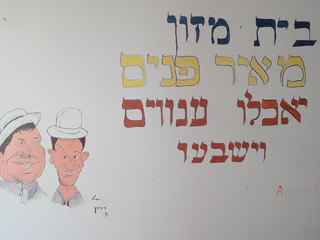 Nissim now arrives, and hurriedly tours me about his facility. He is a giant of a man, easily 6’ 7”, and he has fantastically large ears, hands, and feet. My neck will soon begin to ache, as I’m forced to constantly crane my head back to make eye contact with him. Nissim’s personality, however, seems somewhat dwarfed by his physical enormity. He is not, I immediately discern, a man much given to talking. This, combined with his rudimentary English, makes some of his statements seem abrupt and slightly callous. His customary response to nearly every question I ask is to laugh nervously, as if to say, “Really? You want to know that?”
Nissim now arrives, and hurriedly tours me about his facility. He is a giant of a man, easily 6’ 7”, and he has fantastically large ears, hands, and feet. My neck will soon begin to ache, as I’m forced to constantly crane my head back to make eye contact with him. Nissim’s personality, however, seems somewhat dwarfed by his physical enormity. He is not, I immediately discern, a man much given to talking. This, combined with his rudimentary English, makes some of his statements seem abrupt and slightly callous. His customary response to nearly every question I ask is to laugh nervously, as if to say, “Really? You want to know that?”
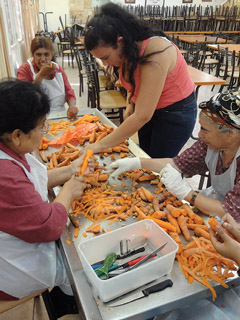 Ten volunteers, mostly women, come every day to help out in the food preparation. In the dining area, I see them gathered about a long table, busily engaged in peeling carrots and pumpkin. In my week of traveling about Israel, I’ve eaten many meals at free restaurants, but this is the nicest dining room I’ve seen yet. One wall is decorated with floral-printed curtains, and a rippling swag of small Israeli flags is strung up from one corner of the room to another.
Ten volunteers, mostly women, come every day to help out in the food preparation. In the dining area, I see them gathered about a long table, busily engaged in peeling carrots and pumpkin. In my week of traveling about Israel, I’ve eaten many meals at free restaurants, but this is the nicest dining room I’ve seen yet. One wall is decorated with floral-printed curtains, and a rippling swag of small Israeli flags is strung up from one corner of the room to another.
Nissim and I stand observing the workers for a few moments, and soon enough, all of them stop work and look up, not with quick, shy glances, but long, unblinking stares. I pretty quickly infer from their wide-eyed and overly-animated facial expressions that most, if not all, of these women have mental disabilities. Not knowing quite how to ask Nissim about this,
I inquire if these women are criminals, like the volunteers I’d spend time with in Tiberias
and Jerusalem.
Nissim chuckles, and replies, “No. I tried that. But I didn’t like having this type of man around. I found their energy to be overly aggressive. With these women, it’s more, how shall I say? They have problems in their heads. They are not normal. No one else would take them, so I hire them. It’s nice. At least most of the time.”
He exhales loudly. After a long silence, Nissim speaks again. “Now they are calm but, trust me, there are times when you don’t want to be around them. The littlest thing can make them upset or angry. A single word can set them off. You never know where or when it’s going to happen, but no matter what, I have to stay calm.”
Though he makes no mention of it, I will subsequently learn what extraordinary efforts Nissim makes on behalf of these women. Among countless other kindnesses, he always arranges a special Pesach feast for them, along with their families and friends. At last year’s Seder, I’m told, over 200 people came.
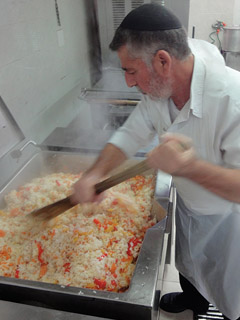 We leave the dining room, and head into a large and exceedingly well-organized kitchen, where Nissim introduces me to Albert, the chef. Albert is midway through one of the countless cigarettes he smokes each day. He is wearing black pants, a white short-sleeved shirt, and a black yarmulke. Albert doesn’t speak much English, but I’m made to understand that he immigrated from Morocco. I’m not surprised,
We leave the dining room, and head into a large and exceedingly well-organized kitchen, where Nissim introduces me to Albert, the chef. Albert is midway through one of the countless cigarettes he smokes each day. He is wearing black pants, a white short-sleeved shirt, and a black yarmulke. Albert doesn’t speak much English, but I’m made to understand that he immigrated from Morocco. I’m not surprised,
as the scent of North African spices are in
the air as Albert stirs a vat of mushrooms, peppers, tomatoes, and green peas. He offers me a spoonful.
“Taim,” I reply, using one of the handful of words I’ve learned in Israel. It means “delicious.”
Nissim takes me back to his office, as he wants to show me a scrapbook he keeps of all visitors from Israel and around the world, who’ve come to see this free restaurant. He’s especially proud of a photograph of himself with Jill Biden, the Second Lady of the United States. (I am astonished the Vice President’s wife ever found her way to this woebegone spot.) He offers me a glass of very cold, and very sweet orange juice.
“With these women, it’s more, how shall I say?
They have problems in their heads. They are not normal. No one else would take them, so I hire them. It’s nice.”
Nissim is 47 and has six children, two of whom are currently serving in the Israeli army.
He opened Meir Panim here in Dimona ten years ago. Before that he worked in various factories in the Dead Sea area, which is nearby, and a rich source of chemicals and minerals, many of which end up being used for medicinal purposes. When I asked him what sorts of things he made, Nissim replies, “Magnesium, mostly. It’s used to make soda cans, and … what is the word, in English, for the thing that makes your bowels open?”
“Laxatives?”
“Laxatives, that’s right. I helped make laxatives.”
I’m quite certain this is the first time I’ve heard this job description.
Why did he decide he wanted to run a soup kitchen?
Nissim smiles, and thumps his chest. “If everyone learned to help others, there would be no problems in this world,” he said. “The future of Israel is its children. If they learn English and Math, and I give them food, they will not end up on the street.”
He then smiles, awkwardly, as if he’s not sure if he’s made a fool of himself by making such a sincere statement. I want to tell him how moved I am by his generosity of spirit, yet I know this will only further embarrass him.
Standing up, Nissim abruptly announces he must now leave, as he’s about to go deliver food to various groups of schoolchildren. While he’s gone, Nissim suggests I help make lunch with the other volunteers.
I probably could have simply opened my mouth
and yawned, and still these women would have
been spellbound by the sounds I made.
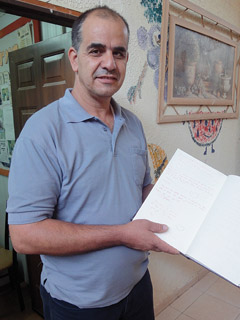 I find my way back to the dining room.
I find my way back to the dining room.
The women have finished the carrots and pumpkins, and have moved on to making a fruit salad. I’m unsure how to join into this operation. Visitors do pass through here from time to time, as Nissim’s guest book can attest, but I doubt many have sat down with the volunteers. In addition to barriers of language, there’s also
the ticklish question of how the sexes are separated in Orthodox Judaism. Handshakes, or any sort of touching, is strictly a no-no. As such, I am acutely aware that I’m a man, a gentile, and a stranger.
To my surprise, then, one of the women hands me a paring knife. Its blade was about as sharp as a piece of cardboard, but I set to work peeling mangoes and peaches, de-stemming grapes, and slicing bananas. Another woman, it’s now revealed, speaks some English. She does her best to translate a fusillade of questions that are now shot my way, as well my answers.
Talk about a captive audience! I probably could have simply opened my mouth and yawned, and still these women would have been spellbound by the sounds I made. All were staring at me, laughing excitedly, and parroting back phrases in English as soon as I’d said them. Their questions came in overlapping waves, so I could never be quite sure if my answers were matching up to any particular inquiry. As they were rendered by the high, gentle voice of the translator, too, nearly all of their questions were limited, somehow, to three words.
“You live where?”
“What you do?”
“What you write?”
“You are rich?”
“You travel world?”
“You go India?”
“You go Goa?”
“She from Goa!
At this, all fingers were pointed at one woman, who promptly screamed in embarrassment and dropped her face forward directly into a huge pile of peach peelings.
“You like Israel?”
“You are Jewish?”
“You are Christian?”
“You no Arab, right?”
“You are married?”
“You have girlfriend?”
“You want girlfriend?”
Only these last questions posed any difficulty for me. Homosexuality is not unknown in Israel, of course, though it is still frowned upon among Orthodox Jews, as Nissim had told me many of these women were. Since I’d arrived in Israel, if anyone asked about my marital status (as Israelis invariably do, and within seconds of first meeting you), I had made no attempt to hide my sexuality, or my life with James. Still. Even though they seemed highly amused by the interrogation I was enduring, hadn’t Nissim told me these women could become extremely upset about even very small things? Proof enough was the Indian woman, from Goa, whose face was still buried in the peaches, just because a few fingers had been pointed her way.
What was I to do here? I thought if I said I was gay, or married to a man, this crowd might get more excited than I would know how to handle. As it happened, though, my failure to answer the question was only making them more agitated.
“You married?”
“You have girlfriend?”
“You married?”
“You married?”
“No,” I finally replied, giving the answer that “confirmed bachelors” have probably given for centuries. “I guess I just haven’t found the right girl.”
This was met with a chorus of groans, and one woman burst into tears.
“I be your girlfriend!”
“No, I his girlfriend.”
“Me, girlfriend!”
“Me, girlfriend!”
“No, me girlfriend!”
It went on like this for quite some time. I peeled mangoes, and spoke not another word.
The next day, I arrived at Meir Panim at half-past seven. Albert told me I could help cook today’s lunch, but first I had a meeting with Rachel Bier, the social worker I’d met earlier. She tells me more about her clients in Dimona. Even those who have jobs, mostly in the Dead Sea factories, make such low wages that after paying rent and utilities, they don’t have enough money left to buy groceries.
“‘It will be fine,’ they think. ‘God will take care of me.’ Then, when they can’t feed all these kids, they end up coming to Nissim.”
“There is tremendous anger. There’s drug and alcohol abuse. And sudden eruptions of violence, for no particular reason. A lot of men need therapeutic treatment, but they won’t come. They say women are the cause of all their problems. Their wife deserves to be beaten because she doesn’t get dinner served on time, or keep the house clean. All problems get worse, though, when you are hungry.”
Another challenge is the fecundity of Orthodox women.
“The Haredim, or the ultra-orthodox, think having many children is a gift from God,” Beir explains. “A lot of women want these children, even though they don’t have any real way to pay for them. ‘It will be fine,’ they think. ‘God will take care of me.’ Then, when they can’t feed all these kids, they end up coming to Nissim.”
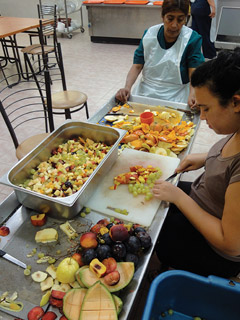 Many of these ultra-orthodox women are completely unfamiliar with the concept of birth control. And, curiously, though her English
Many of these ultra-orthodox women are completely unfamiliar with the concept of birth control. And, curiously, though her English
has been excellent up to this point, Bier
herself does not have the words for what she now wants to say. I teach her the words “contraception” and “abortion.” We sound them out together, several times. Cont-tra-CEP-tion. A-BOR-tion. She knows how to speak these concepts in Hebrew, of course, though Beir feels she can’t press either alternative too
hard upon Haredim women, no matter how poor they are.
“At the end of the day, I return to my house, they go to theirs. I can teach the existence of certain tools, but only they can decide whether or not to use them.”
Listening to Rachel, I find myself wondering how soon it will be before different nations in the world begin to legislate child-bearing, and when birth control will become proscriptive. China has been pilloried for its one family/one child rules and the draconian measures they have taken to enforce this limit. In the future, will China’s stance appear forward-thinking and progressive?
I suspect it will.
It’s now time for me to join Albert in the kitchen. As a sanitary measure he instructs me to put on a white plastic laboratory coat, which is nearly the equivalent of wearing a large garbage bag. It’s close to 100 degrees outside, and no sooner do I put this body-encasing sheath on, then I begin to sweat. Moisture runs off my chest, through my underwear, and down my legs. Welcome to the Negev in summertime! I’m a son of the desert, literally sweating in my boots.
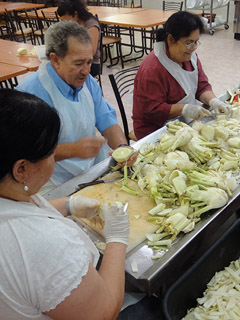 Israeli folk music blares in the background, as the perfume of roasting vegetables fills the air. Moving about the kitchen, I pass through separate clouds of pumpkin, fennel and garlic. The odors are so strong, I feel like I’m eating with my nostrils.
Israeli folk music blares in the background, as the perfume of roasting vegetables fills the air. Moving about the kitchen, I pass through separate clouds of pumpkin, fennel and garlic. The odors are so strong, I feel like I’m eating with my nostrils.
I am put work washing enormous piles of shredded cabbage. First one rinse, then a second, and third. I’ve never been this careful when making cole slaw at home. Usually, I’ll just slice the cabbage as thin as I can, and mix it with dressing.
Albert runs an extremely tidy kitchen. Pots are hosed down before they are washed. They are then dried, and put away at the bottom of a pile, and new ones, from the pile’s top, used for the next task. “Food that is clean tastes better,” he explains, with a shrug. This is a truth so obvious, it hardly needs mentioning. Yet, in this place, where the bar could be set far lower, it is poignant to see how fastidious Albert’s techniques are.
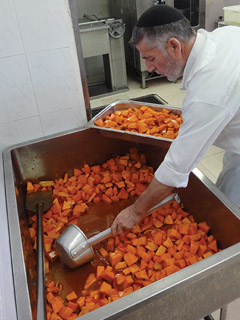 At work on a side dish, he mixes rice with red peppers, carrots, onion and paprika. It smells like Heaven. He’s working in a large stainless steel pan about the size of a shallow bathtub. It has electric heating coils underneath, and can rotate and be emptied by disengaging two central screws that keep it upright, and then pivoting the front downwards. When Albert is done with his recipe, he dumps out rice in huge splurts, expertly filling one stainless steel tray after the next. Making his dexterity all the more remarkable, is that he does this one-handed, while sending a text on his cell phone with the other. Now that’s multi-tasking. I am impressed.
At work on a side dish, he mixes rice with red peppers, carrots, onion and paprika. It smells like Heaven. He’s working in a large stainless steel pan about the size of a shallow bathtub. It has electric heating coils underneath, and can rotate and be emptied by disengaging two central screws that keep it upright, and then pivoting the front downwards. When Albert is done with his recipe, he dumps out rice in huge splurts, expertly filling one stainless steel tray after the next. Making his dexterity all the more remarkable, is that he does this one-handed, while sending a text on his cell phone with the other. Now that’s multi-tasking. I am impressed.
Next he begins to heat up a melange of peas and mushrooms he’d cooked yesterday. Albert believes flavors need to meld, and dishes taste better on the second day, reheated, then they do when first made. As such, he is forever planning and preparing recipes one or two days in advance, and then leaving trays of food to “improve” in the walk-in refrigerator. Later, when I follow him into this chilly cavern, I am amazed at the exotic ingredients donated by local farmers; there are many boxes of sprouted Mung beans, Enoki mushrooms, bunches of fresh mint, Swiss Chard, and cilantro.
“Food that is clean tastes better,” he explains,
with a shrug. This is a truth so obvious, it hardly
needs mentioning.
He sends one of the volunteer girls out to the nearby market, and she takes off at a run, soon returning with two packs of Marlboro Light cigarettes. Before she hands them over, though, much high-volume haggling passes between them. From what I can tell, their argument is over how many cigarettes he will give as payment for having completed this errand for him. Finally, I see Albert fork over exactly one smoke. The girl scurries off, waving it above her head like she’s the victor.
Perhaps because he’s embarrassed I’ve witnessed him in this stingy transaction, Albert now begins screaming at me. “Hurry with the cabbage! There are pots to be washed, too!”
“You know why Moroccans put tampons in their noses don’t you?” This question comes from a man with a South African accent. I turn around, and see a gentleman who appears to be in his mid-sixties, with a brush-cut mustache standing by my side. He’s smiling, and nodding his head towards Albert, the chef. “That’s because when they’re angry, all their blood rushes to their head.”
I smile, even though it takes me a moment to get this crude joke.
The man, who is another kitchen volunteer, introduces himself as Jay Sher. No sooner have we shaken hands in greeting, than Sher wants me to know that he’d recently had an operation on his brain that allows him to carry a medical card proclaiming he suffers from “major memory deficit.” (He gets the card out of his wallet, and proudly shows it to me.) What might have discouraged another man, was for Sher an opportunity. He insists he gets away with murder, saying anything and everything that pops into his mind, as he can later always claim he has no memory of what he just said or did.
I couldn’t tell if this was all a gag, or the truth.
Sher helped me finish washing the mountain of shredded cabbage. He’s originally from Johannesburg, South Africa, but came here as a 19-year-old volunteer to fight with the Israeli Army during the Six Day’s War of 1967. He’s full of exciting tales of skirmishes along the Syrian border, and explanations of how wealthy South Africans figured out ever-more complicated ways to smuggle money into Israel for the war effort.
“Jews will be Jews,” he said. “They are, by and large, a clever bunch.”
“I know, Jay,” I replied. “I live in Manhattan.”
He was extremely charming. If this was what it was like to have a “major memory deficit,” it didn’t seem too bad. Sher invited me to come visit him at his home at the Kibbutz Revivin, which was only a few kilometers away, and was where Golda Meir retired. (Revivin means “a light rain,” something quite desirable in this parched terrain.)
“The glory days of the kibbutzim was in the 1970’s,” Sher said. “Revivin is one of the last of the Mohicans, a real old school kibbutz. We have what’s said to be the biggest olive tree orchard in the whole of the Middle East.”
As he explained it, after Ben Gurion sent some settlers down to what became Revivin, they discovered that beneath the arid terrain of the Negev Desert sits a large subterranean reservoir of brackish water. This allowed them to plant orchards of Halutza olives, the soil and micro-climate conditions proving so ideal, Halutza Olive Oil is now revered by connoisseurs around the world.
Guests are lining up again. It’s time to serve lunch.
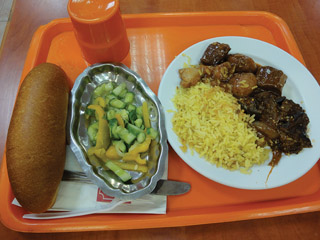 I will not be staying today, as I need to drive on to Tel Aviv. After I take off my plastic lab coat, I find a men’s bathroom, and do my best to mop off my sweaty skin with paper towels. Then, I say my goodbyes to Rachel, Nissim and Albert. As I pass out the front door, I look once again at the mural of Laurel and Hardy. “This is a House of Food; Be Satiated, and Be Humble.”
I will not be staying today, as I need to drive on to Tel Aviv. After I take off my plastic lab coat, I find a men’s bathroom, and do my best to mop off my sweaty skin with paper towels. Then, I say my goodbyes to Rachel, Nissim and Albert. As I pass out the front door, I look once again at the mural of Laurel and Hardy. “This is a House of Food; Be Satiated, and Be Humble.”
There’s something odd about that wording. Satiety and Humility are nearly antithetical states of being, aren’t they?
Lined up on the porch, and down the stairs, is a crowd of people waiting to be fed. I see some of the same Russian ladies from yesterday. I recognize them because of their slippers and house dresses. As I walk down the stairs, I see that my new friend, Jay Sher, is sitting in the back seat of a black Mercedes sedan, talking on a cell phone. His chauffeur is settling himself into the driver’s seat, and adjusting a pair of sunglasses.
Sher waves to me jauntily, as the car takes off, about to return him to the kibbutz.
For him, at least, the desert has clearly bloomed.



